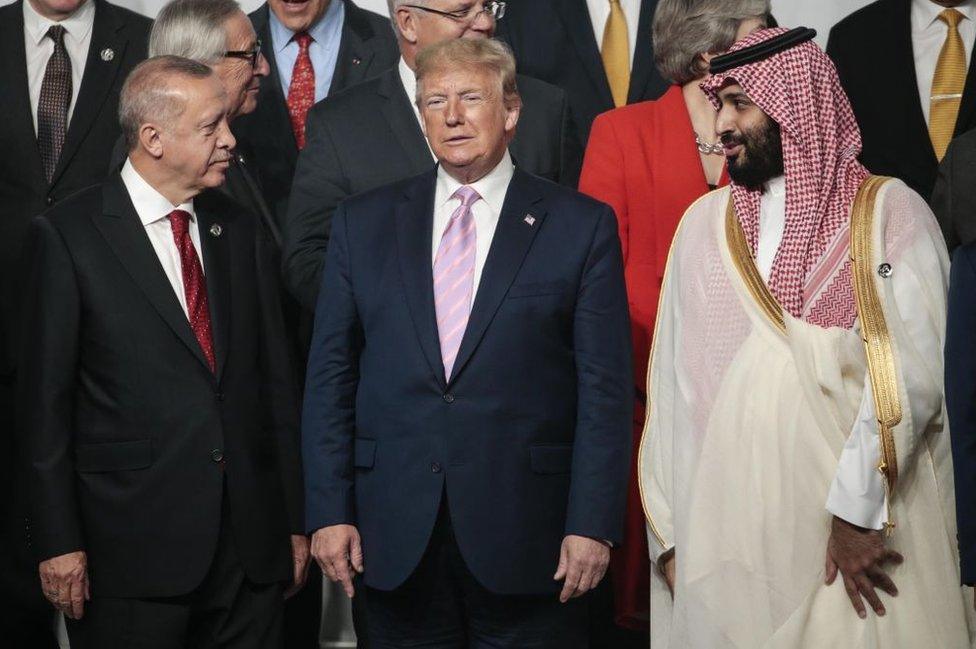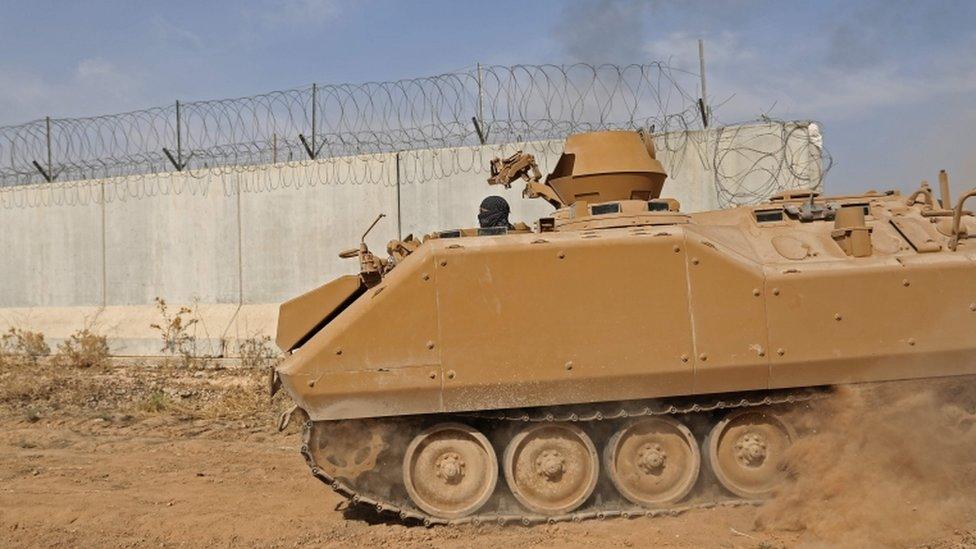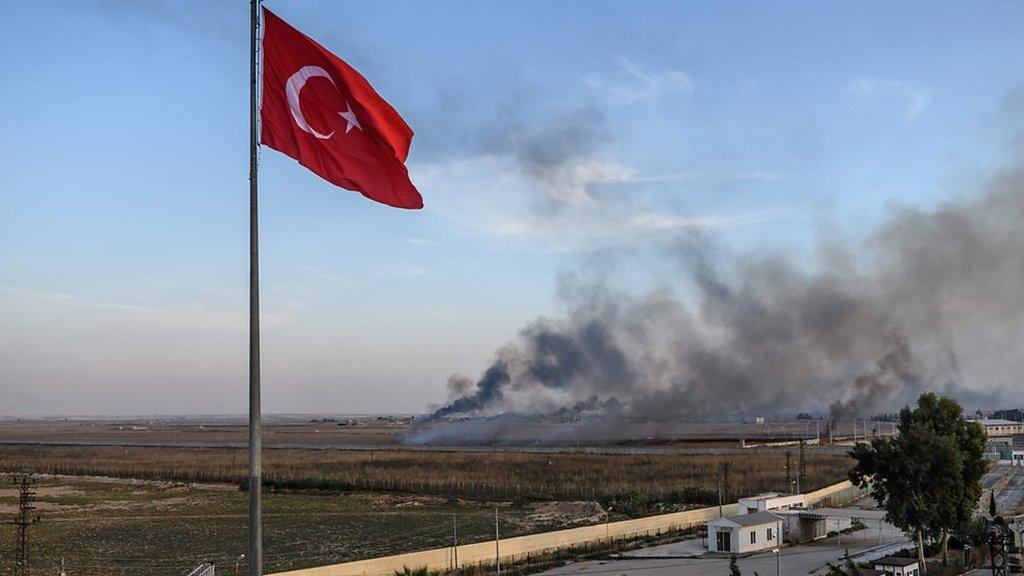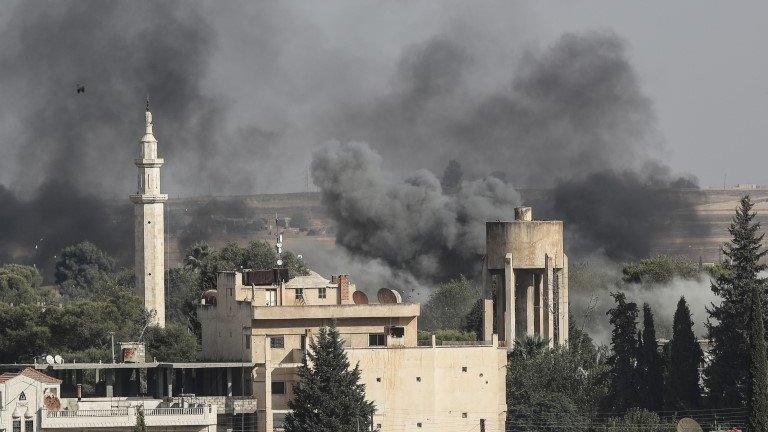Turkey Syria offensive: Trump's week of confusion over US policy
- Published

Mr Trump flanked by the Turkish and Saudi leaders at the G20 summit in June
During a television interview this week, Secretary of State Mike Pompeo said the US did not give a "green light" for Turkey to launch strikes against Kurdish forces in northern Syria. The mixed messages from President Donald Trump over the course of this week, however, tell a different story.
The latest crisis in war-torn Syria began on Sunday night, with a statement from the White House press secretary - after the president had a phone conversation with Turkish President Recep Tayyip Erdogan - that effectively treated a Turkish military incursion as a done deal.
"Turkey will soon be moving forward with its long-planned operation into Northern Syria," the statement read.
"The United States Armed Forces will not support or be involved in the operation, and the United States forces, having defeated the Isis territorial 'Caliphate,' will no longer be in the immediate area."
The statement, which contained no mention of the US-backed Kurds or hints of objection to the Turkish operation, quickly set off howls of anger among the US foreign policy establishment and members of Congress on the left and right.
"This decision to abandon our Kurdish allies and turn Syria over to Russia, Iran, & Turkey will put every radical Islamist on steroids," South Carolina Republican Senator Lindsey Graham tweeted the following morning, external. "Shot in the arm to the bad guys. Devastating for the good guys."
The ferocity of the criticism grew as it became clear that US forces had indeed withdrawn from northern Syria and the Turkish military was launching its assault.
What followed was a series of sometimes contradictory statements and tweets from the president - a hodgepodge of calls for disengagement, warnings of dire consequences, and suggestions of peaceful resolution.
The BBC's Martin Patience explains what's behind the conflict
"We will fight where it is to our benefit, and only fight to win," Mr Trump tweeted on Monday, external, after saying that he held off a Turkey-Kurdish conflict for three years, but that it was time for the US to get out of "endless wars".
By later in the day, however, the president was cautioning Turkey that if it did anything that he considered "off limits" he would "destroy and obliterate the economy of Turkey".
On Tuesday, he was praising Turkey for being a US trading partner and assuring the Syrian Kurds (who were already by this time under Turkish assault) that the US had not abandoned them.
The next day, he said he hoped the Turkish operation would be conducted "in as humane a way as possible" - and, if not, Turkey would pay a "very big economic price".
By Thursday, he was once again distancing himself from the Kurds, telling reporters that while he "liked" them, they were only fighting for "their land" and did not, for instance, help the US invade Germany in the Second World War. (It should be noted that Kurds did fight against Iraqi forces sympathetic to the Nazis.)
Mr Trump concluded Thursday by tweeting that the US "did our job perfectly" in Syria and now had three choices in dealing with the crisis: send thousands of troops to secure the area; impose economic sanctions on Turkey; or "mediate a deal" between the Turks and the Kurds.
Trump: Kurds "didn't help us in Second World War"
He told reporters he preferred the third option.
Meanwhile, Trump administration officials were left scrambling to realise the frequently conflicting objectives of vocalising their objections to a Turkish operation they had long sought to avoid, while defending the president's decision - which, according to Politico and others, external, was made without consulting foreign allies, Congress or even some members of his own administration.
On Monday, Defence Secretary Mark Esper sent - and then deleted - a tweet saying the Turkish move into northern Syria would have "destabilising consequences... to Turkey, the region, & beyond".
The White House on Wednesday released a "statement" by the president saying the Turkish invasion was a "bad idea" that the US did not "endorse". On Friday, Mr Esper called it a "tough situation" and said Turkey's action was damaging US-Turkey relations.

Pro-Turkish Syrian fighters advance into Kurdish-held territory
"This was a very big mistake and this has very big implications for all of our security," a senior State Department official told CNN on Friday, external. "I don't know of anybody who isn't upset with it."
All told, the US moved between 50 to 100 troops out of northern Syria this week, as Turkish forces prepared their assault.
Despite withering criticism, Mr Trump has framed it as fulfilling a campaign promise to extricate the US from a Middle East quagmire it should never have been involved in to begin with.
Indeed, on Thursday night at a rally in Minnesota, he falsely said: "We don't have any soldiers there because we've left. We won. We left. Take a victory, United States."
Yet, hours later, the Defence Department announced that 3,000 US soldiers - including two fighter squadrons - were being dispatched to Saudi Arabia "to ensure and enhance the defence" of that nation.
Since May, a Pentagon spokesperson noted, US troops in the Middle East and Afghanistan "Central Command" region increased by approximately 14,000.
The endless wars, it seems, may not be coming to an end quite yet.

Timeline of US statements
6 Oct - White House releases statement announcing northern Syria withdrawal after Trump reportedly spoke to Erdogan
7 Oct - After criticism from his party, Trump defends exit. "Turkey, Europe, Syria, Iran, Iraq, Russia and the Kurds will now have to figure the situation out", he tweets. He also threatens to "obliterate" Turkish economy
8 Oct - Trump argues Turkey is a strong ally to US and Nato, tweeting, "but in no way have we Abandoned the Kurds, who are special people"
9 Oct - Pompeo says US did not authorise Turkish attack, saying: "The United States didn't give Turkey a green light"
10 Oct - Trump tells reporters the Kurds "didn't help us in the Second World War. They didn't help us with Normandy, as an example." Later he says "I hope we can mediate" between the Kurds and Turkey. Other options, he says, include US military deployment or "financially doing some very strong things to Turkey".
- Published10 October 2019

- Published11 October 2019

- Published4 October 2019
- Published1 October 2019
